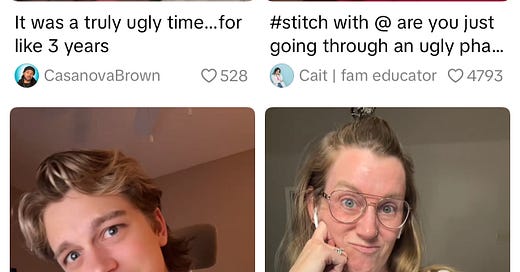Have You Scheduled In Your Next Ugly Time Appointment?
What is Ugly Time and why does the internet say we need it?
I think, I missed the memo but apparently we’re having an Ugly Time summer. If you’re confused, I was too (please share, I can’t have been the only one). I was asked about Ugly Time for an article and at first, completely lost. Like WFT is Ugly Time? After the initial confusion settled, it made sense.
Too much beauty, in its many forms and pressure to be perfect, makes ideal situation for breakdown but in this case Ugly Time. If you’ve read enough of my newsletter, you’ve probably gathered I’m not really into the trendification of what seems like everything. Does Ugly Time really need to be a trend? Surely, taking a step back for ourselves, however that may look, should be just be normal practice?
Ugly Time is basically shorthand for letting yourself go, quite literally. Not making yourself presentable, not engaging in upkeep, not caring. It’s about stepping away from the pressure to always be polished, adhering to standards of beauty but not necessarily out of laziness, think of it more like a protest.
For the article, I mentioned how I think Ugly Time is a manifestation of beauty burnout. Coined by Ellen Atlanta, she refers to beauty burnout as “feeling drained, financially strained, and emotionally overwhelmed by the endless pressure to conform to aesthetic ideals”.
In this context, I get why Ugly Time feels like a release. But when “taking a break” becomes something we have to brand, hashtag, and post about... are we really switching off? Or are we repackaging our exhaustion into another consumable moment?
Every part of our natural humanity as humans seems to be up for grabs. Manufactured into a label that can be controlled and manipulate to sell us another ideal. Plus I’ve seen some of the Ugly Time content, surely some of is just unhealthy and simply unhygienic?
Also important to note, not everyone can afford to opt out of beauty expectations. As soon as something becomes a trend, it’s almost exclusive. For many people, especially marginalised groups, the stakes are different. It’s a privilege to “look ugly” without being treated poorly because of it, even when it’s the trend to be “ugly”.
Maybe the healthiest version of “Ugly Time” is the one that doesn’t get shared at all. It’s something we do for ourselves and quietly. I recently spoke about beauty burnout and giving myself my space from beauty routine (sounds more radical than it is) There something massively contradictory about having to signal your disengagement. That contradiction is at the core of so much of trend culture.
We're also living in an era of compliance. We’re constantly told what to do, how to feel, and what to say, rather than being left to our own devices, to figure things out for ourselves or stay curious. This is how hyper-specific beauty routines take root in our lives. We're called the copy-and-paste generation of a reason: we’re literally walking, talking regurgitations of TikTok trends and now even our rebellion is less rebellious and more conformity.
I guess there is a sense of comfort in uniformity, in conformity. Maybe that’s part of why the beauty community feels so strong. Trends create a shared reality for the people consuming them. We’re all speaking the same language, sharing the same experiences, bonding over the same “ugly time” routines. But the catch: social media platforms aren’t designed for connection nor understanding. They’re built for engagement and polarisation. And algorithms don’t reward nuance. They push certainty and content that’s easy to digest. So while our sense of community might feel real, it’s being shaped by systems that don’t actually prioritise any depth or our care. That makes for a community that’s… well, kind of flimsy.
When there is a shift in priority from internal curiosity to external performance, we’re less likely to stop asking if something actually serves us. We become easier to market to, easier to manipulate and the beauty industry thrives on this. And that doesn’t just affect beauty trends, it impacts everything, how we make choices as consumers, and individuals.
Ultimately trends, whether it’s a process of beautification or in this case, embodying a state of ugliness, are a form of communication. Trends communicate, how we should look, even if it’s just for short periods of time. I don’t think Ugly Time should be a trend, do you? I think it should be mundane. I definitely think it should be something we do without posting about it. I think rest should exist without commentary, (but also if you really want to, you can, of course).
Maybe this summer isn’t about Ugly Time. Maybe it’s just about doing what’s good for you. About deciding that how we look or don’t look, isn’t a trend played out irl. No trends, no aesthetic, no digital footprint.
Please read the NOD article, it’s a great piece! https://thenodmag.com/content/ugly-time-gen-z-beauty-wellness-trend




